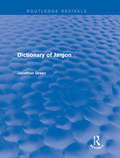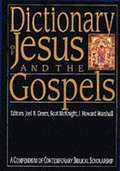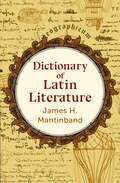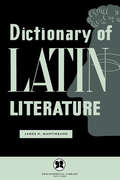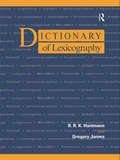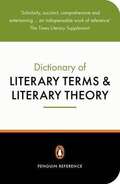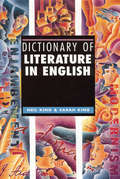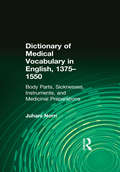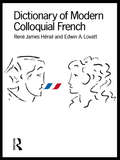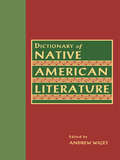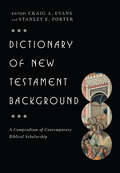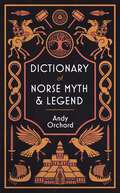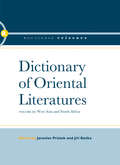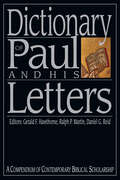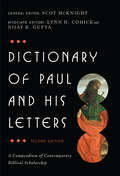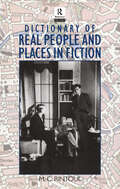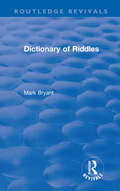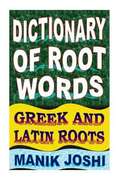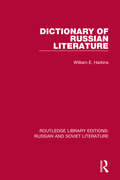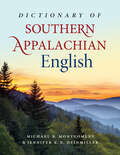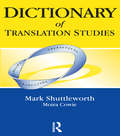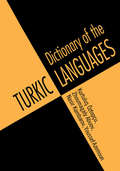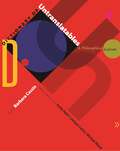- Table View
- List View
Dictionary of Jargon: A Dictionary Of Jargon (Routledge Revivals)
by Jonathon GreenFirst published in 1987, the Dictionary of Jargon expands on its predecessor Newspeak (Routledge Revivals, 2014) as an authoritative reference guide to specialist occupational slang, or jargon. Containing around 21, 000 entries, the dictionary encompasses a truly eclectic range of fields and includes extensive coverage of both British and U.S. jargon. Areas dealt with range from marketing to medicine, from advertising to artificial intelligence and from skiing to sociology. This is a fascinating resource for students of lexicography and professional lexicographers, as well as the general inquisitive reader.
Dictionary of Jesus and the Gospels: A Compendium of Contemporary Biblical Scholarship
by Scot Mcknight Joel B. Green I. Howard MarshallRecipient of a Christianity Today1993 Critics Choice Award! Third Place Winner of Christianity Today's Book of the Year list award! The Dictionary of Jesus and the Gospels is unique among reference books on the Bible, the first volume of its kind since James Hastings published his Dictionary of Christ and the Gospels in 1909. In the more than eight decades since Hastings our understanding of Jesus, the Evangelists and their world has grown remarkably. New interpretive methods have illumined the text, the ever-changing profile of modern culture has put new questions to the Gospels, and our understanding of the Judaism of Jesus' day has advanced in ways that could not have been predicted in Hasting's day. But for many readers of the Gospels the new outlook on the Gospels remains hidden within technical journals and academic monographs. The Dictionary of Jesus and the Gospels bridges the gap between scholars and those pastors, teachers, students and lay people desiring in-depth treatment of select topics in an accessible and summary format. The topics range from cross-sectional themes (such as faith, law, Sabbath) to methods of interpretation (such as form criticism, redaction criticism, and death of Jesus) to each of the four Gospels as a whole. Some articles--such as the Dead Sea Scrolls, rabbinic traditions and revolutionary movements at the time of Jesus--provide significant background information to the Gospels.
Dictionary of Latin Literature
by James H MantinbandDiscover the essential works of Latin literary masters with this A-to-Z reference guide spanning from ancient Rome to the Renaissance. In Dictionary of Latin Literature, classics scholar and translator James H. Mantinband provides students and curious readers with an authoritative, accessible, and wide-ranging reference book. It includes detailed entries on significant works and authors as well as important terms and concepts. Covering the history of Latin literature from the early Roman Republic to the Middle Ages and the Renaissance, this single volume offers a treasure trove of fascinating information.
Dictionary of Latin Literature
by James H. MantinbandJames H. Mantinband's Dictionary of Latin Literature introduces readers to the essential works of the Latin masters. An excellent tool for students and curious readers alike, this dictionary provides guides to the original works and their modern criticisms. An expert in Greek and Latin literature, James H. Mantinband has written and edited dictionaries and reference works on the subjects including Concise Dictionary of Greek Literature, Dictionary of Latin Literature, and Dictionary of Greek Literature. He has also translated several classic plays including Four plays of Aristophanes: The clouds, The birds, Lysistrata, The frogs.
Dictionary of Lexicography
by R. R. Hartmann Gregory JamesDictionaries are among the most frequently consulted books, yet we know remarkably little about them. Who makes them? Where do they come from? What do they offer? How can we evaluate them?The Dictionary of Lexicography provides answers to all these questions and addresses a wide range of issues:* the traditions of dictionary-making* the different types of dictionaries and other reference works (such as thesaurus, encyclopedia, atlas and telephone directory)* the principles and concerns of lexicographers and other reference professionals* the standards of dictionary criticism and dictionary use.It is both a professional handbook and an easy-to-use reference work.This is the first time that the subject has been covered in such a comprehensive manner in the form of a reference book. All articles are self-contained, cross-referenced and uniformly structured. The whole is an up-to-date and forward-looking survey of lexicography.
Dictionary of Literary Terms and Literary Theory (4th edition)
by J. A. Cuddon C. E. PrestonDefinitions of technical terms and critical jargon, as well as explanations of literary movements, schools of literary theory, genres, and literary forms
Dictionary of Literature in English
by Sarah King Neil KingThis dictionary is a guide to the key authors, concepts, and terms used in the study of literature written in English. Each entry begins with a straightforward definition, and is followed by explanation and examples. Each writer is defined by type, significant preoccupation and/or style, and a selection of notable works. There are a number of entries on writers in a foreign language who have had a major influence on literature in English. One of the most important uses of this book is as a cross-referencing tool. Italicized cross-referenced entries form an interrelated web, presenting a unified overall picture of particular areas of interest.
Dictionary of Medical Vocabulary in English, 1375–1550: Body Parts, Sicknesses, Instruments, and Medicinal Preparations
by Juhani NorriMedical texts written in English during the late Middle Ages have in recent years attracted increasing attention among scholars. From approximately 1375 onwards, the use of English began to gain a firmer foothold in medical manuscripts, which in previous centuries had been written mainly in Latin or French. Scholars of Middle English, and editors of medical texts from late medieval England, are thus faced with a huge medical vocabulary which no single volume has yet attempted to define. This dictionary is therefore an essential reference tool. The material analysed in the Dictionary of Medical Vocabulary in English, 1375–1550 includes edited texts, manuscripts and early printed books, and represents three main types of medical writing: surgical manuals and tracts; academic treatises by university-trained physicians, and remedybooks. The dictionary covers four lexical fields: names of sicknesses, body parts, instruments, and medicinal preparations. Entries are structured as follows: (1) headword (2) scribal variants occurring in the texts (3) etymology (4) definition(s), each definition followed by relevant quotations (5) references to corresponding entries in the Dictionary of Old English, Middle English Dictionary, and The Oxford English Dictionary (6) references to academic books and articles containing information on the history and/or meaning of the term.
Dictionary of Modern Colloquial French
by E A Esq R. J. H 'erail E. A. LovattFirst published in 1987. Routledge is an imprint of Taylor & Francis, an informa company.
Dictionary of Native American Literature (Garland Reference Library Of The Humanities Ser. #Vol. 1815)
by Andrew WigetFirst Published in 1995. Routledge is an imprint of Taylor & Francis, an informa company.
Dictionary of New Testament Background: A Compendium of Contemporary Biblical Scholarship (The IVP Bible Dictionary Series)
by Craig A. Evans Stanley E. PorterDictionary of New Testament BackgroundDictionary of Jesus and the Gospels, the Dictionary of Paul and His LettersDictionary of the Later New Testament and Its DevelopmentsDictionary of New Testament BackgroundDictionaryDictionary of New Testament Background
Dictionary of Newfoundland English
by W. J. Kirwin G. M. Story J.D.A. WiddowsonThe Dictionary of Newfoundland English, first published in 1982 to regional, national and international acclaim, is a historical dictionary that gives the pronunciations and definitions for words that the editors have called "Newfoundland English". The varieties of English spoken in Newfoundland date back four centuries, mainly to the early seventeenth century migratory English fishermen of Cornwall, Devon, Dorset and Somerset, and to the seventeenth to the nineteenth century immigrants chiefly from south-eastern Ireland. Culled from a vast reading of books, newspapers and magazines, this book is the most sustained reading ever undertaken of the written words of this province. The dictionary gives not only the meaning of words, but also presents each word with its variant spellings. Moreover, each definition is succeeded by an all-important quotation of usage which illustrates the typical context in which word is used. This well-researched, impressive work of scholarship illustrates how words and phrases have evolved and are used in everyday speech and writing in a specific geographical area. The Dictionary of Newfoundland English is one of the most important, comprehensive and thorough works dealing with Newfoundland. Its publication, a great addition to Newfoundlandia, Canadiana and lexicography, provides more than a regional lexicon. In fact, this entertaining and delightful book presents a panoramic view of the social, cultural and natural history, as well as the geography and economics, of the quintessential lifestyle of one of Canada's oldest European-settled areas. This second edition contains a Supplement offering approximately 1500 new or expanded entries, an increase of more than 30 per cent over the first edition. Besides new words, the Supplement includes modified and additional senses of old words and fresh derivations and usages.
Dictionary of Norse Myth & Legend
by Andrew OrchardFrom Loki to Thor, Ragnarok to BeowulfA gripping and truly mesmerising delve into the Norse legendsFrom bestselling books to blockbusting Hollywood movies, the myths of the Scandinavian gods and heroes are part of the modern day landscape.For over a millennium before the arrival of Christianity, the legends permeated everyday life in Iceland and the northern reaches of Europe. Since that time, they have been perpetuated in literature and the arts in forms as diverse as Tolkien and Wagner, graphic novels to the world of Marvel. This book covers the entire cast of supernatural beings, from gods to trolls, heroes to monsters, and deals with the social and historical background to the myths, topics such as burial rites, sacrificial practices and runes.
Dictionary of Norse Myth & Legend
by Andrew OrchardFrom Loki to Thor, Ragnarok to BeowulfA gripping and truly mesmerising delve into the Norse legendsFrom bestselling books to blockbusting Hollywood movies, the myths of the Scandinavian gods and heroes are part of the modern day landscape.For over a millennium before the arrival of Christianity, the legends permeated everyday life in Iceland and the northern reaches of Europe. Since that time, they have been perpetuated in literature and the arts in forms as diverse as Tolkien and Wagner, graphic novels to the world of Marvel. This book covers the entire cast of supernatural beings, from gods to trolls, heroes to monsters, and deals with the social and historical background to the myths, topics such as burial rites, sacrificial practices and runes.
Dictionary of Oriental Literatures 3: West Asia and North Africa
by Jaroslav Průšek Jirí BeckaThe Dictionary of Oriental Literatures fills a long-felt gap in Western literature by presenting a concise summary, in three volumes and about 2000 articles, of practically all the literatures of Asia and North Africa. The first volume describes the Chinese, Tibetan, Japanese, Korean and Mongolian literatures; the second covers the area of South and South-East Asia, comprising, besides all literatures of India and Pakistan, those of Nepal, Bangladesh, Sri Lanka, Myanmar, Thailand, Cambodia, Vietnam, Indonesia, Malaysia and the Philippines; and the third is devoted to the numerous literatures of West Asia and North Africa. including on the one hand the literatures of the ancient Near East and Egypt, and on the other hand those of Central Asia and the Caucasus, of Turkey, Iran, Afghanistan and of the various Arab countries including Morocco, Tunisia and Algeria. The majority of entries give information about the life and work of the individual writers and poets of the classical, medieval and modern periods of the literatures included and also attempt to evaluate their writings from the historical and aesthetic point of view. The remaining articles describe literary terms, genres, forms, schools, movements etc. The Dictionary has been prepared by the Oriental Institute in Prague under the supervision of a Advisory Editorial Board of European and American scholars of international reputation and is unique in that it is the fruit of the collaboration of over 150 orientalists from many parts of the world. Contents include: Volume I East Asia: The Far East, including Chinese, Tibetan, Japanese, Korean and Mongolian literatures. Volume II South and South-East Asia: Ancient Indian, Assamese, Baluchi, Bengali, Gujarati, Hindi, Indian literature in English, Indo-Persian, Kannada, Kashmiri, Maithili, Malayalam, Marathi, Oriya, Panjabi, Pashto, Rajasthani, Sindhi, Tamil, Telugu and Urdu, Sinhalese, Nepali, Burmese, Thai, Cambodian, Malay and Indonesian, Javanese, Vietnamese and Philippines literatures. Volume III West Asia and North Africa: The Near East and Egypt, Central Asia and the Caucasus, Turkish, Persian, Afghan, Kurd and Arabic literatures, covering all the Arab states from Iraq in the East to Algeria in the West.
Dictionary of Paul and His Letters: A Compendium of Contemporary Biblical Scholarship (The IVP Bible Dictionary Series)
by Gerald F. HawthorneDictionary of Paul and His LettersDictionary of Jesus and the GospelsDictionaryDictionary of Paul and His LetterssummaDictionary of Paul and His LettersDictionary of Jesus and the Gospels
Dictionary of Paul and His Letters: A Compendium of Contemporary Biblical Scholarship (The IVP Bible Dictionary Series)
by Lynn H. Cohick Scot McKnight Nijay K. GuptaThe Dictionary of Paul and His Letters is a one-of-a-kind reference work. No other resource presents as much information focused exclusively on Pauline theology, literature, background, and scholarship. This second edition is a thoroughly revised and updated version of the acclaimed 1993 publication. Since that groundbreaking volume was published, developments in Pauline studies have continued at a rapid pace, with diverse new scholars entering the conversation, new ideas and methods gaining attention, and fresh expressions of old topics shaping the present discussion. Those who enjoyed and benefited from the wealth in the first edition will find this new edition an equally indispensable and freshly up-to-date companion to study and research. Classic topics such as Christology, justification, hermeneutics, and book studies of individual epistles receive careful treatment by specialists in the field. Topics new to this edition—including Paul and politics, patronage, and interpretations from various historical and cultural perspectives—expand the volume's breadth and usefulness. Over 95% of the articles have been written specifically for this edition. This work bridges the gap between scholars and pastors, teachers and students, and all interested readers who want a thorough treatment of key topics in a summary format. In curating and compiling these articles, the editors have sought to make them comprehensive, accessible, and useful for those pursuing further research on particular subjects. Each article's bibliography, in addition, will serve a new generation of readers for years to come. The updated Dictionary of Paul and His Letters takes its place alongside the Dictionary of Jesus and the Gospels, 2nd ed., and the other volumes in the IVP Bible Dictionary Series as a unique presentation of the fruit of biblical studies—committed to Scripture, using the best of critical methods, and maintaining dialogue with both contemporary scholarship and the challenges facing the church. The reference volumes in the series provide in-depth treatment of biblical and theological topics in an accessible encyclopedia format, including cross-sectional themes, methods of interpretation, significant historical or cultural background, and each Old and New Testament book as a whole.
Dictionary of Real People and Places in Fiction
by M.C. RintoulFascinating and comprehensive in scope, the Dictionary of Real People and Places in Fiction is a valuable source for both students and teachers of literature, and for those interested in locating the facts behind the fiction they read. In a single, scholarly volume, it provides intriguing insight into the real identity of people and places in the novels of over 300 American and British authors published in the nineteenth and twentieth centuries.
Dictionary of Riddles (Routledge Revivals)
by Mark BryantOriginally published in 1990 by Routledge, Dictionary of Riddles is a collection of nearly 1500 of the most cryptic and entertaining riddles from history. Drawn from sources throughout the world, the collection ranges from earthy medieval jokes about fleas, worms and vegetables to the sophisticated puzzles composed by literary figures from Schiller, Swift, Voltaire, Rousseau and Cervantes to Edgar Allan Poe, Lewis Carroll and J.R.R. Tolkien. The book traces the history of riddles from their origins in antiquity through the golden age of the Renaissance, to their decline into the nursery and the first few signs of their modern revival, and draws together all the strands of the riddling art. Dictionary of Riddles received a Special Commendation in Reference Review’s Best Specialist Reference Books of 1990 Awards.
Dictionary of Root Words Greek and Latin Roots: English Word Power
by Manik JoshiDictionary of Root Words Greek and Latin Roots
Dictionary of Russian Literature (Routledge Library Editions: Russian and Soviet Literature #3)
by William E. HarkinsThis book, first published in 1957, provides essential information on the entire field of Russian literature, as well as a great deal on literary criticism, journalism, philosophy, theatre and related subjects. Russian literary tradition has tended to blur the distinctions between social and political criticism on one hand, and literary criticism on the other, and even, to an extent, the distinction between philosophy and literature. Although intended primarily as a reference work, this book also contains much critical analysis.
Dictionary of Southern Appalachian English
by Michael B. Montgomery & Jennifer K. N. HeinmillerThe Dictionary of Southern Appalachian English is a revised and expanded edition of the Weatherford Award–winning Dictionary of Smoky Mountain English, published in 2005 and known in Appalachian studies circles as the most comprehensive reference work dedicated to Appalachian vernacular and linguistic practice. Editors Michael B. Montgomery and Jennifer K. N. Heinmiller document the variety of English used in parts of eight states, ranging from West Virginia to Georgia—an expansion of the first edition's geography, which was limited primarily to North Carolina and Tennessee—and include over 10,000 entries drawn from over 2,200 sources. The entries include approximately 35,000 citations to provide the reader with historical context, meaning, and usage. Around 1,600 of those examples are from letters written by Civil War soldiers and their family members, and another 4,000 are taken from regional oral history recordings. Decades in the making, the Dictionary of Southern Appalachian English surpasses the original by thousands of entries. There is no work of this magnitude available that so completely illustrates the rich language of the Smoky Mountains and Southern Appalachia.
Dictionary of Translation Studies
by Mark ShuttleworthPublished at a time of unprecedented growth of interest in translation, the Dictionary of Translation Studies aims to present the insights of a number of different approaches to translation in an unbiased, non-partisan way. With more than 300 articles, this essential volume provides the reader with a snapshot of a rapidly developing discipline, based on work produced in serveral languages. With a clear, easy-to-follow layout, the Dictionary provides a comprehensive and highly accessible survey of key terms and concepts (such as Abusive Translation, Equivalence, Informationsangebot, Minimax Principle, Texteme and Thick Translation), types of activity (Autotranslation, Dubbing, Signed Language Interpreting), and schools and approaches (Leipzig School, Manipulation School, Nitra School). Each term is presented within the context in which it first occurred and is given a definition which is both clear and informative. Major entries include a discussion of relevant viewpoints as well as comments on how the usage and application of the term have developed subsequent to its coining. In addition, all entries provide suggestions for further reading, and there is an extensive bibliography included at the end. This is an indispensable tool for anyone studying or teaching translation at university level.
Dictionary of Turkic Languages
by Zhoumagaly Abuov Nasir Kambarov Youssef AzemounThis multi-language dictionary covers the eight major Turkic languages: Turkish, Azerbaijani, Turkmen, Uzbek, Uighur, Kazakh, Kirgiz, and Tatar. 2000 headwords in English are translated into each of the eight Turkic languages. Words are organized both alphabetically and topically. Original script and Latin transliteration are provided for each language. For ease of use, alphabetical indices are also given for the eight languages. This is an invaluable reference book for both students and learners and for those enaged in international commerce, research, diplomacy and academic and cultural exchange.
Dictionary of Untranslatables: A Philosophical Lexicon (Translation/Transnation #35)
by Barbara CassinCharacters in some languages, particularly Hebrew and Arabic, may not display properly due to device limitations. Transliterations of terms appear before the representations in foreign characters.This is an encyclopedic dictionary of close to 400 important philosophical, literary, and political terms and concepts that defy easy—or any—translation from one language and culture to another. Drawn from more than a dozen languages, terms such as Dasein (German), pravda (Russian), saudade (Portuguese), and stato (Italian) are thoroughly examined in all their cross-linguistic and cross-cultural complexities. Spanning the classical, medieval, early modern, modern, and contemporary periods, these are terms that influence thinking across the humanities. The entries, written by more than 150 distinguished scholars, describe the origins and meanings of each term, the history and context of its usage, its translations into other languages, and its use in notable texts. The dictionary also includes essays on the special characteristics of particular languages--English, French, German, Greek, Italian, Portuguese, Russian, and Spanish.Originally published in French, this one-of-a-kind reference work is now available in English for the first time, with new contributions from Judith Butler, Daniel Heller-Roazen, Ben Kafka, Kevin McLaughlin, Kenneth Reinhard, Stella Sandford, Gayatri Chakravorty Spivak, Jane Tylus, Anthony Vidler, Susan Wolfson, Robert J. C. Young, and many more.The result is an invaluable reference for students, scholars, and general readers interested in the multilingual lives of some of our most influential words and ideas.Covers close to 400 important philosophical, literary, and political terms that defy easy translation between languages and culturesIncludes terms from more than a dozen languagesEntries written by more than 150 distinguished thinkersAvailable in English for the first time, with new contributions by Judith Butler, Daniel Heller-Roazen, Ben Kafka, Kevin McLaughlin, Kenneth Reinhard, Stella Sandford, Gayatri Chakravorty Spivak, Jane Tylus, Anthony Vidler, Susan Wolfson, Robert J. C. Young, and many moreContains extensive cross-references and bibliographiesAn invaluable resource for students and scholars across the humanities
